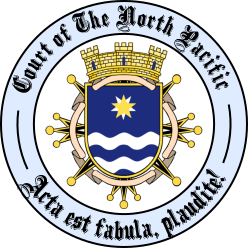@Lord Dominator and
@St George
As a note, we should be aware that the judicial election is approaching, and we really should have a ruling out before the 28th. I don't think we're far from a ruling that we can all sign on to.
I took a pair of scissors to my ruling in an effort to cut down the size. I've gone from roughly
3000 (~18000 characters) words to
1900 (~11000 characters). This was mostly by removing the superfluous citations and Section 4 wholesale, and cleaning up a few other places. I'm still willing to cut more if there are other superfluous areas, but as I said, those are hard for me to find. Lastly, I killed two of my darlings, the (Currently entirely hypothetical) claims of jurisdiction over embassies and extradition.
I still believe the analysis of what is wrong with the ruling is essential to the reason for changing anything. Without some flaw to correct the review is pointless and we should just uphold the ruling. Then there is the material difference between LD's draft and mine, which is the ability to indict and try non-residents. I'd still champion the arguments I made earlier on that part.
St George in your last post you remarked on formatting. I have tried to clean it up to be consistent. If I missed anywhere then please point those out to me.
Ruling of the Court of The North Pacific
In regards to the judicial inquiry filed by @Vivanco On Jurisdictional Claims
Opinion drafted by Chief Justice @Attempted Socialism, joined by
The Court took into consideration the inquiry filed here by Vivanco.
The Court took into consideration the legal brief filed here by Vivanco.
The Court took into consideration the legal brief filed here by @Zyvetskistaahn.
The Court took into consideration the relevant portions of the Constitution of The North Pacific:
Article 4. The Court
1. The Court will try all criminal cases and review the constitutionality of laws or legality of government policies and actions.
2. Reviews of laws or government policies and actions must be made by request of an affected party unless there is a compelling regional interest in resolving it.
(...)
5. The official opinion of the Court in any trial or review will be binding on all Government bodies and officials.
The Court took into consideration the relevant portions of the Court Rules and Procedures:
Chapter 5: Precedent and Appeals
Section 1: Precedent
- All official Court decisions are legally binding on the Court as a whole as well as each individual Justice.
- Prior decisions made by the Court, regardless of its composition at the time, must continue to be obeyed by the Court and by each individual Justice until and unless their validity is formally overturned in a new request for review.
- The Court is a reactive body. Without any such request, the Court may not proactively overturn previous rulings.
The Court took into consideration the relevant portions of prior rulings:
The Court opines the following:
This ruling is in reply to the Request for Review by Vivanco. It will proceed in 6 sections. In Section 1 the petitioner’s standing and regional interest will be noted. In Section 2 the ability of the Court to review prior rulings will be outlined. In Section 3 the Court will analyse the prior ruling and highlight two points of contention. In Section 4 the Court will resolve the ambiguity found in the analysis. In Section 5 the Court will revise the prior ruling. Sections 2 and 3 are to be considered statements of facts. Sections 4 and 5 are the Court’s Holding in the case.
Section 1: Standing and regional interest
Standing
Petitioner Vivanco is duly appointed Court Examiner in accordance with Section 3.6 of the Legal Code. They have universal standing in all cases of Judicial Review. As such the petitioner has standing.
Regional interest
The question before the Court is one of jurisdiction; the applicability of the collection of laws, rights, and duties that The North Pacific has duly ratified and imposed. There can be no doubt that the topic has regional interest. As a prior ruling establishes a precedent, the Court finds itself under a heightened standard of review. Therefore the Court recognises that regional interest is not enough, but it has to establish its own jurisdiction to uphold, revise, or overturn the prior ruling, and the Court has to explain itself fully if it desires to revise or overturn precedent.
The Court finds that it does so in Sections 2 and 3.
Section 2: The Court’s ability to review prior rulings
The Request for Review targets a prior ruling by the Court, asking the Court to review whether the ruling stands as precedent or shall be overturned. In past cases the Court has placed emphasis on precedent, and with good reason. Those rulings have the same prescriptive force as a law, and instructs Government officials in their behaviour. To cite precedent on the matter, the Court turns to its prior ruling
On the Nature of Precedent and the Scope of the Court’s Powers:
(...) the Court is obliged to review its own decisions should the need arise (and a proper request be made - arbitrary requests for review every time a new Court is elected are not permissible), as it is responsible for doing with all governmental policies (...)
The law must be allowed to evolve to match society, and conclusively binding decisions carry with them the potential to greatly restrict the ability of the law, and the Court, to adjust with the times.
The Court does not believe, however, that precedent may be overturned sua sponte (...) furthermore [we] believe that a heightened standard of review must be followed when reviewing the decisions of a previous Court, out of respect and deference to the law as established by our predecessors.
In other words, the Court must explain itself fully when overturning precedent. The Court must try, wherever possible, to act in accordance with precedent, so long as that precedent does not conflict with new law, or the fundamental principles of justice established by the Constitution and Bill of Rights.
The Court does not need to find a prior ruling unconstitutional or unlawful to overturn it. The Court, through deliberate review as requested by a person with standing, can find that a prior ruling is in conflict with fundamental principles of justice or the societal norms of The North Pacific as it has evolved since that ruling.
The Court, therefore, has jurisdiction to uphold, revise, or overturn, the challenged ruling with the caveats cited above.
Section 3: Analysis of the prior ruling
The Court finds two points of contention with On the Jurisdiction of the Criminal Code. Firstly, while one reading is clearly intended, there is enough possible ambiguity to force through a reading giving the opposite result, and secondly, the ruling does not sufficiently delineate the jurisdiction of The North Pacific to offer justice and protection to the lawful residents of The North Pacific.
The intended meaning of the ruling is quite clear. The first sentence is that “any nation may be prosecuted for crimes other than treason”, which in context is meant to say that former residents can be prosecuted in absentia for crimes committed while residents. This is reinforced by the later line “they may be tired [sic] even if their nation no longer resides in The North Pacific”. However, if one chooses so, they may read an almost limitless claim to jurisdiction into the ruling by focusing on “any nation may be prosecuted” and in the later line the “expected of committing a crime in The North Pacific”. This sort of ambiguity is explicitly what the Court is mandated to resolve by the Constitution.
While resolving ambiguity is worthwhile on its own, the intended meaning is not without flaws. The prior ruling is explicit in dealing with current residents or former residents who are on trial for alleged crimes committed while residents, but that is not in keeping with the social fabric as it has developed. The North Pacific res publica is not limited to the region proper, but also extends to the Forum and the Discord. A person could join The North Pacific’s Forum or Discord without having a nation reside in the region with the explicit intention of committing crimes, or make sure to leave the region prior to committing a crime. Under the ruling as it stands, the Court would not have jurisdiction to try that person.
The Court finds that the points of contention are causes for concern, and sufficient to justify revisiting the precedent set in the ruling. The Court also finds that either point of contention would be enough to live up to the heightened standard of review set by On the Nature of Precedent and the Scope of the Court’s Powers.
Section 4: Resolving ambiguity
The challenged ruling is disambiguated here by the Court holding that the former reading, presented in the analysis, is the correct one. There shall be no doubt that the jurisdiction demarcated by the ruling, prior to this review, was limited to residents of The North Pacific and those nations whose alleged crimes were committed while residents of The North Pacific. The Court did not make extensive claims to jurisdiction in all imaginable future cases where a breach of Legal Code could be expected.
Section 6: Revising jurisdictional claims
The Court furthermore revises its prior ruling to develop a more substantive and workable set of jurisdictional claims. Those claims will be developed here with the necessary clarification. The Court notes that some of these revisions are currently hypothetical. The Court intends to make the ruling comprehensive even in the case of future drastic changes to civil society in The North Pacific or the inter-regional political stage.
If a former resident or non-resident is alleged to have committed a criminal act and is indicted for it, but does not accept the indictment and trial, they can be tried in absentia in accordance with the ordinary regulations for a trial.
Residents of The North Pacific
Adopted from the challenged ruling, and as stipulated by both the Constitution and the Legal Code, residents of The North Pacific fall under the jurisdiction of The North Pacific.
Former residents
Adopted from the challenged ruling, former residents can be tried for crimes they are alleged to have committed while residents of The North Pacific.
Crimes committed on North Pacific soil
Regardless of residency, The North Pacific claims jurisdiction over crimes committed against residents or the region, as stipulated by the Criminal Code, in cases where that crime happened on North Pacific soil. Soil is here understood to be the equivalent to the physical territory of the region, which is at minimum the Region – including World Factbook Entry, regional Dispatches, and the Regional Message Board – the Forum, and the regional communication platform(s) – currently the collection of The North Pacific’s Discord servers.
Acts that can be considered crimes but which are handled by e.g. the Administration do fall under the aegis of The North Pacific, but the Court does not invite the Government or citizens to press charges in cases of spam or obscene material when those cases are better handled administratively.
Jurisdiction over specific crimes committed against the region
The North Pacific as a community must be protected from outside opposing actors, and one avenue is the possibility of bringing those foreign actors to trial, banning them from the region’s soil and rejecting future attempts to gain citizenship. In cases of alleged crimes clearly committed against The North Pacific, and attempts to destabilise the region, the Court would accept an indictment and trial of people who have allegedly committed the crimes of Treason (Legal Code section 1.1); Espionage (LC 1.2); Crashing (LC 1.6); Phishing (LC 1.7); and Conspiracy (LC 1.11) where the alleged conspiracy includes non-resident actors.



